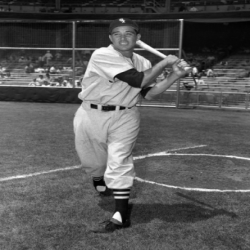
Chico Carrasquel
Baseball player
| Date of Birth | : | 23 January, 1928 |
| Date of Death | : | 26 May, 2005 (Aged 77) |
| Place of Birth | : | Caracas, Venezuela |
| Profession | : | Baseball Player |
| Nationality | : | American |
Alfonso Carrasquel Colón, better known as Chico Carrasquel, was a Venezuelan professional baseball player, coach, scout and manager. He played in Major League Baseball (MLB) as a shortstop from 1950 to 1959, most prominently as a member of the Chicago White Sox where he became the first Latin American in MLB history to start in an All-Star Game in 1951. A four-time All-Star known for his exceptional defensive skills, Carrasquel was the first in a long line of Major League shortstops from Venezuela including, Luis Aparicio, Dave Concepción, Ozzie Guillén and Omar Vizquel among others. He also played for the Cleveland Indians, Kansas City Athletics and the Baltimore Orioles.
After his playing career, Carrasquel worked as a manager in the Venezuelan Winter League and also worked as a major league scout. He later worked as a color commentator on the White Sox' Spanish language game broadcasts and, as the team's Community Relations Representative. In 2003, he was selected in the inaugural class of the Venezuelan Baseball Hall of Fame and Museum.
Playing career
Born in Caracas, Carrasquel began his professional baseball career in 1946 at the age of 17 with the Cervecería Caracas team, where he hit the first home run in Venezuelan Professional Baseball League history. He was signed in 1949 by the Brooklyn Dodgers, and was immediately promoted to the Double-A Fort Worth Cats. Carrasquel provided good fielding and hit .315 during the season and .364 in the playoffs to help spur the Cats to the 1949 Texas League championship. His inability to speak English fluently may have caused Dodgers General Manager Branch Rickey to sell him to the Chicago White Sox although, Rickey later admitted that the move was a mistake. White Sox' General Manager Frank Lane solved the language communication problem by trading Carrasquel's uncle Alex for reliever Witto Aloma, who served as the interpreter between Carrasquel and White Sox' manager Jack Onslow.
Carrasquel joined the White Sox in 1950, becoming the third Venezuelan to play in Major League Baseball after his uncle, Alex Carrasquel (Washington Senators, 1939) and Chucho Ramos (Cincinnati Reds, in 1944). He became the White Sox's starting shortstop, replacing the 41-year-old Luke Appling, who had held the position since 1930. Carrasquel soon established himself as an excellent defensive player, combining with second baseman Nellie Fox to make one of the best double play combinations in the league. His cheerful disposition and apparent love for playing baseball, made him extremely popular with Chicago fans. As a rookie, Carrasquel hit for a career-high .282 batting average in 141 games and, amassed a 24-game hitting streak until Red Sox pitcher Ellis Kinder stopped the streak. In September, he suffered a torn cartilage in his right knee and had to sit out the remainder of the season. Carrasquel finished the season ranked third in voting for the American League Rookie of the Year Award, behind Walt Dropo and Whitey Ford, and finished 12th in the 1950 American League Most Valuable Player Award ballot.
In 1951, Carrasquel beat out the reigning American League Most Valuable Player, Phil Rizzuto, in voting for the shortstop of the American League in the 1951 All-Star Game. He became the first Latin American player to be selected to start in an All-Star Game. On July 19, 1951, Carrasquel broke Rizzuto's Major League record by handling 297 consecutive chances in 53 games without committing an error. The record would stand for 18 years until 1969, when Don Kessinger of the Chicago Cubs set a new record by playing in 54 games without committing an error. He ended the year leading the league's shortstops in assists and in fielding percentage. In November 1951, it was reported that Boston Red Sox manager, Lou Boudreau, wanted to trade Ted Williams for Carrasquel but Lane refused the offer.
Carrasquel had an off year in 1952 as a broken finger and then weight problems saw his batting average drop to .248 in 100 games. After the 1952 season, trade rumors reportedly had the Cleveland Indians offering the American League's runs batted in champion, Al Rosen, in exchange for Carrasquel but, the trade never transpired. In 1953, Carrasquel was once again voted as the starting shortstop for the American League in the 1953 All-Star Game and ended the season first among the league's shortstops in fielding percentage.
During spring training in 1954, it was reported that White Sox manager Paul Richards was not pleased with Carrasquel's lack of effort on the field. It was a charge that would continue to pursue Carrasquel for the remainder of his tenure with the White Sox. Carrasquel responded with his most productive season in 1954, when he was voted to make his third start as the American League shortstop in the 1954 All-Star Game and, posted career-highs in home runs (12), RBI (62), hits (158), runs (106), extra-base hits (43), walks (85). Batting as the White Sox leadoff hitter, he led the league in games played and in plate appearances while hitting for a .255 batting average. Defensively, he led the league's shortstops in double plays and in fielding percentage.
Quotes
Total 0 Quotes
Quotes not found.